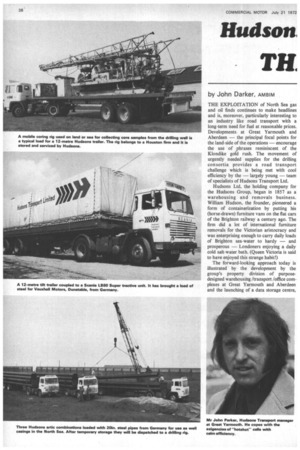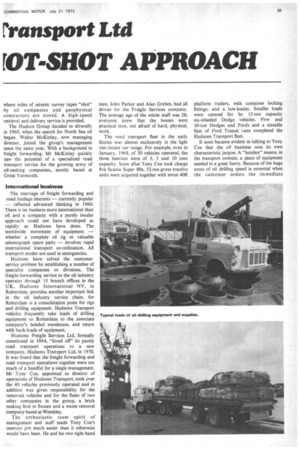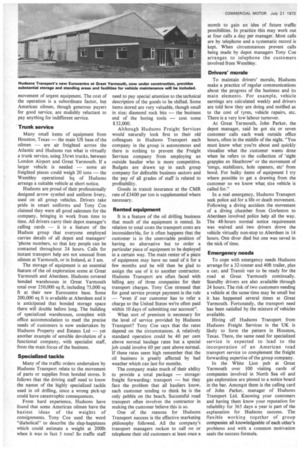Hudson.
Page 40

Page 41

Page 42

If you've noticed an error in this article please click here to report it so we can fix it.
rransport Ltd
111
r0T-SHOT APPROACH
by John Darker, AMBIM
THE EXPLOITATION of North Sea gas and oil finds continues to make headlines and is, moreover, particularly interesting to an industry like road transport with a long-term need for fuel at reasonable prices. Developments at Great Yarmouth and Aberdeen — the principal focal points for the land-side of the operations — encourage the use of phrases reminiscent of the Klondike gold rush. The movement of urgently needed supplies for the drilling consortia provides a road transport challenge which is being met with cool efficiency by the — largely young — team of specialists of Hudsons Transport Ltd.
Hudsons Ltd, the holding company for the Hudsons Group, began in 1857 as a warehousing and removals business. William Hudson, the founder, pioneered a form of containerization by putting his (horse-drawn) furniture vans on the flat cars of the Brighton railway a century ago. The firm did a lot of international furniture removals for the Victorian aristocracy and was enterprising enough to carry daily loads of Brighton sea-water to hardy — and prosperous — Londoners enjoying a daily cold salt-water bath. (Queen Victoria is said to have enjoyed this strange habit!) The forward-looking approach today is illustrated• by the development by the group's property division of purposedesigned warehousing /transport /office complexes at Great Yarmouth and Aberdeen and the launching of a data storage centre, where miles of seismic survey tapes "shot" by oil companies and geophysical contractors are stored. A high-speed retrieval and delivery service is provided.
The Hudson Group decided to diversify in 1960, when the search for North Sea oil began. Walter McKinlay, now managing director, joined the group's management team the same year. With a background in freight forwarding, Mr McKinlay quickly saw the potential of a specialized road transport service for the growing army of oil-seeking companies„ mostly based at Great Yarmouth.
International business
The marriage of freight forwarding and road haulage interests — currently popular — reflected advanced thinking in 1960. There is no business more international than oil and a company with a purely insular approach could not have developed as rapidly as Hudsons have done. The worldwide movement of equipment — whether a complete oil rig or valuable seismograph spare parts — involves rapid international transport co-ordination. All transport modes are used in emergencies.
Hudsons have solved the customerservice problem by establishing a number of specialist companies or divisions. The freight-forwarding service to the oil industry operates through 15 branch offices in the UK. Hudsons International NV, in Rotterdam, provides another important link in the oil industry service chain, for Rotterdam is a consolidation point for rigs and drilling equipment. Hudsons Transport vehicles frequently take loads of drilling equipment to Rotterdam to the associate company's bonded warehouse, and return with back-loads of equipment.
Hudsons Freight Services Ltd, formally constituted in 1964, "hived off" its purely road transport operations to a new company, Hudsons Transport Ltd, in 1970. It was found that the freight forwarding and road transport operations together were too much of a handful for a single management. Mr Tony Coe, appointed as director of operations of Hudsons Transport, took over the 40 vehicles previously operated and in addition was given responsibility for the removals vehicles and for the fleets of two other companies in the group, a brick making firm in Sussex and a waste removal company based at Wembley.
The enthusiastic team spirit of management and staff made Tony Coe's onerous job much easier than it otherwise would have been. He and his two tight-hand men, John Parker and Alan Grebot, had all driven for the Freight Services company. The average age of the whole staff was 28; everyone knew that the bosses were practical men, not afraid of hard, physical, work.
The road transport fleet in the early Sixties was almost exclusively in the light van /estate car range. For example, even in January, 1968, of 30 vehicles operated, the three heaviest were of 3, 5 and 10 tons capacity. Soon after Tony Coe took charge five Scania Super 80s, 32-ton-gross tractive units were acquired together with seven 40ft platform trailers, with container locking fittings, and a low-loader. Smaller loads were catered for by 15-ton capacity six-wheeled Dodge vehicles. Fiveand 10-ton Dodges and Fords and a sizeable fleet of Ford Transit vans completed the Hudsons Transport fleet.
It soon became evident in talking to Tony Coe that the oil business uses its own characteristic jargon. A "hotshot" means, in the transport context, a piece of equipment needed in a great hurry. Because of the huge costs of oil drilling speed is essential when the customer orders the immediate movement of urgent equipment. The cost of the operation is a subordinate factor, but American oilmen, though generous payers for good service, are mulishly reluctant to pay anything for indifferent service.
Trunk service Many small items of equipment from Houston, Texas — the main US base of the oilmen — are air freighted across the Atlantic and Hudsons run what is virtually a trunk service, using 35cwt trucks, between London Airport and Great Yarmouth. If a larger vehicle is needed — some air freighted pieces could weigh 20 tons — the Wembley operational hq of Hudsons arrange a suitable vehicle at short notice.
Hudsons are proud of their professionally designed arrow symbol and uniform livery, used on all group vehicles. Drivers take pride in smart uniforms and Tony Coe claimed they were all good salesmen for the company, bringing in work from time to time. All drivers carry their depot manager's calling cards — it is a feature of the Hudson group that everyone employed carries details of all depot and managers' 'phone numbers, so that key people can be contacted throughout 24 hours. Calls for instant transport help are not unusual from oilmen at Yarmouth, or in Ireland, at 3 am.
The storage of equipment is an essential feature of the oil exploration scene at Great Yarmouth and Aberdeen. Hudsons covered bonded warehouses in Great Yarmouth total over 250,000 sq ft, including 75,000 sq ft at their new Eurocentre base. Some 200,000 sq ft is available at Aberdeen and it is anticipated that bonded storage space there will double before long. The building of specialized warehouses, complete with office accommodation to meet the precise needs of customers is now undertaken by Hudsons Property and Estates Ltd — yet another example of sensible devolution of a functional company, with specialist staff, from the main focus of the business.
Specialized tackle Many of the traffic orders undertaken by Hudsons Transport relate to the movement of parts or supplies from bonded stores. It follows that the driving staff need to know the names of the highly specialized tackle used in oil drilling, since a wrong pick-up could have catastrophic consequences.
From hard experience, Hudsons have found that some American oilmen have the haziest ideas of the weights of consignments. Tony Coe used the word "diabolical" to describe the slap-happiness which could estimate a weight at 2001b when it was in fact 5 tons! So traffic staff need to pay special attention to the technical description of the goods to be shifted. Some items stored are very valuable, though small in size; diamond rock bits — the business end of the boring tools — cost some $32,000.
Although Hudsons Freight Services would naturally look first to their old colleagues in Hudsons Transport each company in the group is autonomous and there is nothing to prevent the Freight Services company from employing an outside haulier who is more competitive. Budgets are drawn up in each group company for definable business sectors and the -pay of all grades of staff is related to profitability.
Goods in transit insurance at the CMR rate of £.3400 per ton is supplemented where necessary.
Rented equipment It is a feature of the oil drilling business that much of the equipment is rented. In relation to total costs the transport costs are inconsiderable, for it often happens that the customer is in the unenviable position of having no alternative but to order a particular piece of equipment to be deployed in a certain way. The main renter of a piece of equipment may have no need of it for a few months and he will •then be glad to assign the use of it to another contractor. Hudsons Transport are often faced with billing any of three companies for their transport charges. Tony Coe stressed that for good service prompt payment is the rule — "even if our customer has to refer a charge to the United States we're often paid within 10 days of submitting our account".
What sort of premium is necessary for the level of service provided by Hudsons Transport? Tony Coe says that the rates depend on the circumstances. A relatively standard operation could be 40 per cent above normal haulage rates but a special job could involve 60 per cent above normal. If these rates seem high remember that the oil business is greatly affected by bad weather which can .last for months.
The company make much of their ability to provide a total package — storage: freight forwarding: transport but they face the problem that all hauliers know, each customer tending to think he is the only pebble on the beach. Successful road transport often involves the contractor in making the customer believe this is so.
One of the reasons for Hudsons Transport success is the effective marketing philosophy followed. All the company's transport managers reckon to call on or telephone their old customers at least once a month to gain an idea of future traffic possibilities. In practice this may work out at four calls a day per manager. Most calls are by telephone and a systematic record is kept. When circumstances prevent calls being made by depot managers Tony Coe arranges to telephone the customers involved from Wembley.
Drivers' morale To maintain drivers' morale, Hudsons make a practice of regular communications about the progress of the business and its main elements. For example, vehicle earnings are calculated weekly and drivers are told how they are doing and notified as to the cost of tyres, vehicle repairs, etc. There is a very low labour turnover.
At Great Yarmouth, John Parker, the depot manager, said he got six or seven customer calls each week outside office hours, often in the middle of the night. "You must know what you're about and quickly visualize what the customer wants done when he refers to the collection of 'eight grapples ex Heathrow' or the movement of 'tongs, stabilizers, hole openers, etc' from bond. For bulky items of equipment I try where possible to get a drawing from the customer so we know what, size vehicle is called for."
In a real emergency, Hudsons Transport seek police aid for a life or death movement. Following a diving accident the movement of a diving chamber from Gorleston to Aberdeen involved police help all the way. The 48-hours normal notice requirement was waived and two drivers drove the vehicle virtually non-stop to Aberdeen in 14 hours. One diver died but one was saved in the nick of time.
Emergency needs To cope with emergency needs Hudsons arrange for a 32-tonner and 40ft trailer, plus a car, and Transit van to be ready for the road at •Great Yarmouth continually. Standby drivers are also available through 24 hours. The risk of two customers needing a vehicle at the same time may be small but it has happened several times at Great Yarmouth. Fortunately, the transport need has been satisfied by the mixture of vehicles available.
Hiving off Hudsons Transport from Hudsons Freight Services in the UK is likely to form the pattern in Houston, Texas. There, the same need for specialized service is expected to lead to the incorporation of an American road transport service to complement the freight forwarding expertise of the group company.
In the White Lion pub at Great Yarmouth over 100 visiting cards of companies involved in North Sea oil and gas exploration are pinned to a notice board in the bar. Amongst them is the calling card of John Parker, manager of Hudsons Transport Ltd. Knowing your customers and having them know your reputation for reliability for 365 days a year is part of the explanation for Hudsons success. The flexible working together of group companies all knowledgeable of each other's problems and with a common motivation seals the success formula.




























































































